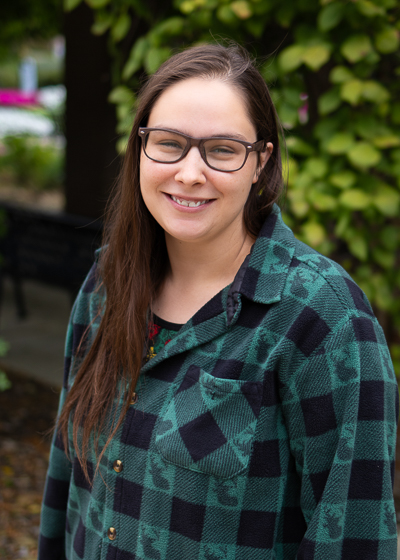Heather Murdoch
Heather Murdoch is an MGI doctoral student working in Rob Abramovitch's lab. These are her answers to the Micro Biography questions:

How and when did you become interested in the field(s) of microbiology, genetics, and/or immunology?
So, I became interested in this field during my undergraduate career. I originally was planning on being a doctor in cardiothoracic surgery, but fell in love with my undergraduate project that involved understanding how microbial communities change in different environments on reindeer lichen. Even though I didn’t understand how these microbial communities interacted, I was fascinated by the knowledge that I was generating and how there were so many different questions that I could ask that there never seemed to be an “end point" - unlike in the classroom.
Were there any particular people or events who were influential in your journey?
There have been so many different people that have been influential in my journey, I could write a book. My undergraduate advisor, my master’s thesis advisor, my PI now - Rob Abramovitch, my student mentor - Shelby Dechow, Zack Blount, Debbie Walton, and my thesis committee (Neal Hammer, Danny Ducat, Stephanie Shames, and Andrew Olive) and the Abramovitch lab have really helped me not only build the confidence to be a successful scientist, but have truly helped me overcome my imposter syndrome. The reason why I never really considered a career in the avenues that I am looking at now is because I did not truly believe that I was capable of achieving these career goals, because I have struggled not only in confidence, but with being what the world labels as “smart.” Research has allowed me to see that everyone is on the same playing field, and that even if I may not be on the same level as my colleagues originally, persistence and effort are the key to earning a Ph.D, and I am living proof of that. Philip Delekta, Vilma, Rique Campa, David Arnosti, and Alyssa Laberge have been very influential in helping me truly realize the life that I want to live and the influence that I want to bestow on others. I truly want to make a difference not only in microbiology, but in education and have begun to realize the potential that I can make when I decide to really be committed to something. Earning a Ph.D isn’t just about effort and persistence, but it is also about committment. The wonderful thing about this realization for me is that I know now that I am in control of all three of these areas, and I plan to empower indigenous people to be able to do the same, despite the inequities that we may face.
How did you come to be a part of this department?
I really enjoyed the department culture, and I found the science fascinating when I was reviewing it on the website!
What is your main role / research area right now and why is it important?
Mycobacterium tuberculosis has a unique adaptation during infection within the macrophage that allows it to adapt to acidic pH and arrest its Mtb undergoes metabolic reprogramming in order to arrest its growth, this then allows it to become drug tolerant. My research focuses on these metabolic adaptations, and identifying key players to present as more effective drug targets, since treatment is on average 3-6 months because of these different subpopulations of cells that are replicating, or non-replicating.
How do you see your role / research evolving?
With the targets that I am identifying, I know that we can create more sustainable drug targets that can shorten tuberculosis treatment.
What types of activities are you involved in outside of work / research?
I am involved in ComSciCon which is an organization focused on supporting students in science communication careers.
I am also involved in running a research program known as Building Bridges which supports indigenous students in pursuing graduate school, helping students in exploring research, meeting indigenous scholars, and in creating resumes, personal statements, research statements, and posters. I also aim through this program to help Indigenous students not only become more aware of careers in research but to grow their confidence in establishing a career in science.
I am also involved in FAST, Future Academic Scholarly Training, and plan to continue helping with this as well.
I also am a math and science tutor for the indigenous community here in East Lansing for high schoolers.
Is there anything else you’d like to share?
I am also very passionate about students learning to balance their time so that they can focus on what’s important and their priorities - whatever that may be! I struggled with this personally and still continue to struggle on this topic, which is why my educational research was focused on time management in the classroom and the importance of implementing this! Students can do everything that they truly believe is a priority, but proper time management is SO KEY!
What is next for you?
I plan on finalizing a couple of research papers in my work and my educational fellowship work, wrapping up my research, and finishing an indigenous research and methodologies certificate, as well as my graduate teaching certificate!
What do you see as your current career trajectory?
My current career trajectory is to become a faculty member at an undergraduate education institution. The ultimate dream is to become a faculty member at an undergraduate institution that has a strong indigenous population, or is looking to increase their indigenous student population so I can create programs to improve indigenous student retention.